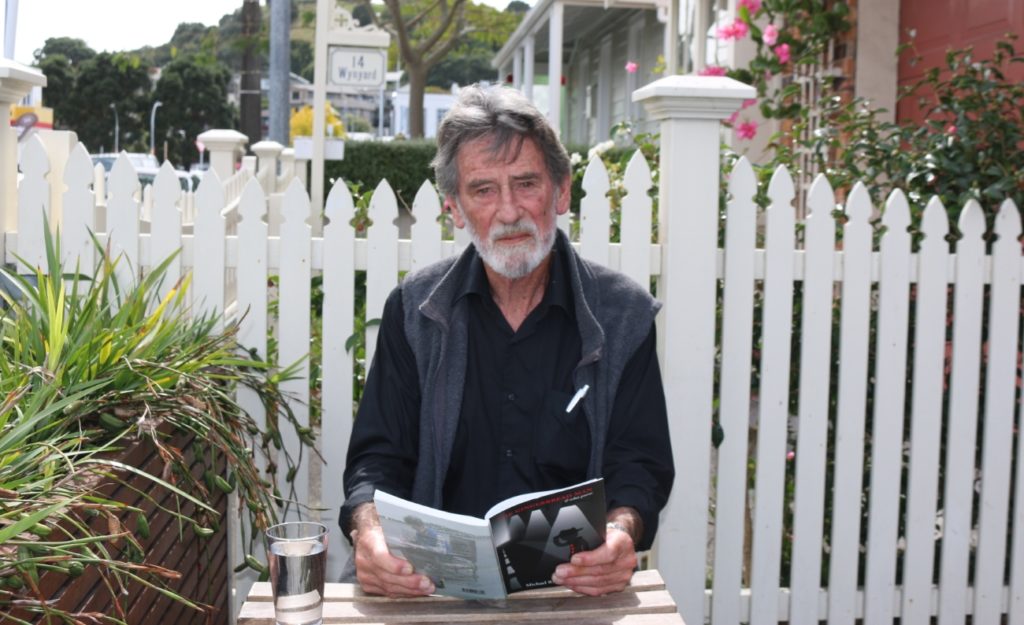What's New
3 April, 2019
Interview: Poet Mike Richards – Devonport looms large in poetry of a lifetime

A 1967 meeting with Sam Hunt helped inspire a young Mike Richards to take a new direction with his poetry, which more than 50 years later has been formed into a collection. The former musician and Takapuna Grammar School teacher talks to Jodi Yeats.
A Maori chief reimagined as a bee, a doomed romance in Devonport and a storm hitting Takapuna Grammar School’s playing fields inspired some of the poems in a new collection from a local writer.
At 74, Mike Richards has just had his first collection of poetry, The Gingerbread Man & other poems, published by Steele Roberts.
One of the early poems, Patuone, arose from a weekly meeting in Devonport with two friends and Richards’ father (also a poet).
The idea evolved that each week someone would choose a topic, and the next week everyone would bring back a poem they had written on it.
“This mate who lived in Devonport said Patuone was a Maori chief who lived in Devonport and converted to Christianity.
“I used this image of him as a bee, getting what he could and making compromises.”
Richards wasn’t well acquainted with Maori activism, but he had the feeling tangata whenua had not been well treated, which is captured in the poem’s last line: “… he gave an acre to gain a yard.”
As a young man, growing up in Bayswater and attending Takapuna Grammar, Richards played cricket and soccer, and taught himself guitar and drums, playing with a schoolboy band.
Music was a theme in his life and he was in a band inspired by the Shadows through his time at university, studying for a masters in English from 1963 to 1966.
In the 1970s, he played in the Doug Lomax Band and then a dance band, Wastecote, that went through several name changes.
He went on to join blues band Riverbed Slide, which frequently performed at the Masonic Tavern.
It was drinking alone at the Masonic, after being stood up by a woman, that inspired the poem Church Street corner, about the seaside clock over the road.
I sit here killing time time till seven,
watch the clock in its concrete silo,
await a conjunction of hands.
Sam Hunt was a strong influence on Richards’ work and the pair became lifelong friends.
While at university, Richards taught himself motor mechanics, through working on his own V8, and became something of an expert.
After study, in 1967, he went to teachers training college. That year, Richards was at home one morning at a rented cottage on the beach at Castor Bay, hanging out the washing, when Hunt loomed into view between the folded sheets.
He was coming to seek advice on buying a 1937 Ford, but was keen to drink beer. Talk soon turned to their shared interest in poetry.
“I had been studying English poems for four years and was writing like that.
“When I met Sam, he was reeling off poems. I thought there’s a whole new approach here.”
While Richards still enjoys the poets he discovered at university, such as W B Yeats, W H Auden and Jacobean poets, Hunt introduced him to New Zealand poets, including Denis Glover, Alistair Campbell and James K Baxter.
These poets used colloquial language, and were inspired by images, emotions and experiences, rather than ideas.
Hunt also quoted from the lyrics of pop artists: Rod Stewart, the Rolling Stones and, especially, Bob Dylan, which struck a chord with musician Richards.
One of Richards’ subsequent poems, Carol’s Birthday, about a renowned Stanley Pt clothing designer, ponders the Rolling Stones song Carol, and riffs on band members’ personalities.
The meeting with Hunt was a turning point for Richards. They stayed in touch and, in 1987, Richards edited Hunt’s Selected Poems.
Over the years, Hunt gave Richards good “workman-like advice” on writing verse, including the suggestions of starting with a first line, rather than working towards a last line, and using the first three words as a title, if one doesn’t spring out of the poem.
“It was drinking alone at the Masonic, after being stood up by a woman, that inspired the poem Church Street corner”
Richards taught in two stints for 13 years at his former school, Takapuna Grammar, as well as teaching in England, Germany, Glenfield College and winding up teaching part-time at Westlake Boys for 11 years.
In 1975, Prose and Cons, a book he had co-written with author David Hill, was published for use as a teaching aid.
In his second time working at Takapuna Grammar, between 1977 and 1989, Richards mainly taught English. The weather out on the playing fields one day inspired his poem August storm.
It seems as if the sea below
Were suddenly up here too,
Flowing finally over land.
His poems variously capture difficult moments in Richards’ marriage and divorce, then the aforementioned doomed romance, which inspired another evocative composition, North Head picnic.
I am glad you are not here,
Just the sense of you, a ghost at noon
In the blond, blowing head of the toetoe
Struck by wind, the serious slope
Of your nose, your eyes winter water,
Your body the ground where I rest.
There’s a more joyous tone to poems about meeting his now partner, Sue, and spending time at her home in Cheltenham, where he confessed:
I liked you. A risky statement at my age,
but one that wind and trees and you
made possible.
Richards has finally gone public with his poetry, selecting 100 poems from a much larger body of work, with a little help and advice, as always, from writerly friends Hill and Hunt.
Richards will read from The Gingerbread Man & other poems at the book’s launch at Depot Artspace, 4.30pm on 14 April.
This article originally appeared in the April 5 edition of the Devonport Flagstaff. Download PDF.
